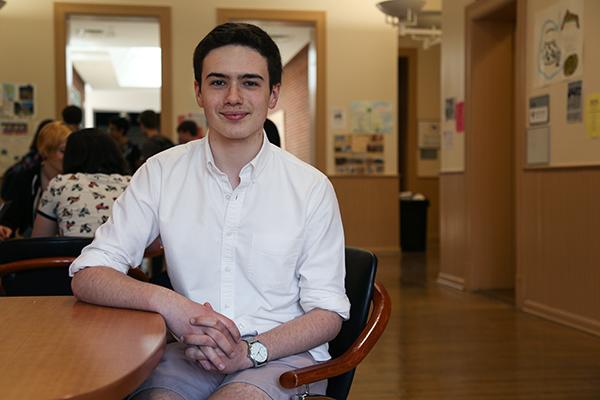The D.C. Council is reviewing a bill drafted by a School Without Walls student.
Nicholas Stauffer-Mason, 17, from Mount Pleasant, D.C., wrote a bill proposing ways to inform D.C. residents released from prison about their voting rights. The student introduced the bill to the Council, which is the culmination of the student’s year-long research project, on April 5.
Stauffer-Mason said he focused the bill on changing D.C. laws to require parole officers and court officials to notify returning citizens of their voting rights as part of the prison release process in D.C.
Stauffer-Mason said all the seniors at the School Without Walls work on year-long research projects on topics of their choice, and he focused on social justice and felon disenfranchisement. He said he received support on his project from community members, and they encouraged him to submit his work to the D.C. Council for consideration.
“I wanted to focus on misinformation and a lack of awareness around voting rights in D.C. among ex-offenders,” he said.
Stauffer-Mason researched statistics on ex-offenders’ voter disenfranchisement and found that many citizens returning from jail are not aware that they can vote when they are released, he said. Nationally, 5.53 million people cannot vote because of a prior felony conviction, making up 2.5 percent of the electorate, Stauffer-Mason said he found in his research.
As part of his project, Stauffer-Mason created a petition to change D.C.’s policies on Change.org two months ago. More than 300 people signed the petition.
After he saw that so many people supported changing policies, Stauffer-Mason said he decided to send the petition and the drafted bill to the D.C. Council.
“I wanted to go ahead and make sure those individuals who signed the petition had their voices heard and that the ideas were communicated effectively to the city’s leaders,” he said.
Foggy Bottom Council member Jack Evans introduced the bill to the Council on April 5. Ten Council members co-sponsored Stauffer-Mason’s bill.
“It will hopefully become law very soon,” Stauffer-Mason said.
Even though Stauffer-Mason is not yet old enough to vote, he said voting is important to him – especially in this year’s presidential election.
“Because I can’t vote in this election, I’m cognizant of the fact that I would vote if I could,” he said. “In an ideal world, I believe that everyone who wants to vote should be able to do that.”
He said working on the bill reaffirmed his dream of working in politics. He will study political science and economics at the University of Chicago this fall, he said.
Stauffer-Mason said his experience with the bill shows that individual citizens can make changes on the issues they care about.
“If individuals have an idea that they think is a good idea, and they have an issue that they care about, they can go for it and actually make a difference,” he said.
Richard Trogisch, the principal of School Without Walls, said the school requires every graduating senior to complete a 15-page research paper and project about an issue that they care about.
“The fact that his topic also benefitted the city is just another feather in Nico’s cap and proof that high school students are capable of making a significant contribution to the city that they live in,” Trogisch said.







